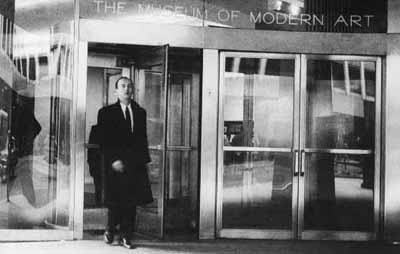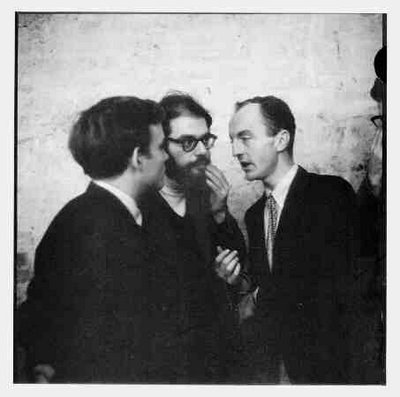 POETRY
POETRY « In Which He Liked Frank O'Hara For The Same Reason He Had Not Liked Him Before »
 Wednesday, April 1, 2009 at 10:43AM
Wednesday, April 1, 2009 at 10:43AM 
A Note on Frank O'Hara In The Early Fifties
by KENNETH KOCH
The first thing of Frank O'Hara's I ever read was a story in the Harvard Advocate in 1948. It was about some people drunkenly going up stairs. During the next year, when I was living in New York, John Ashbery told me that Frank had started to write poems and that they were very good. I forget if I met Frank before or after John told me he had started writing poems. Actually, as I later found out, Frank had started writing poetry a long time before, and prose was only a temporary deviation for him.
 In any case, the first time I read some of Frank's poems was in the summer of 1950, just before I left for France on a Fulbright grant. John Ashbery had mailed them to me and had described them enthusiastically. I didn't like them very much. I wrote back to John that Frank was not as good as we were, and then gave a few reasons why.
In any case, the first time I read some of Frank's poems was in the summer of 1950, just before I left for France on a Fulbright grant. John Ashbery had mailed them to me and had described them enthusiastically. I didn't like them very much. I wrote back to John that Frank was not as good as we were, and then gave a few reasons why.
These poems by Frank were somehow packed in one of my suitcases when I went abroad, and I happened to read them again when I was in Aix-en-Provence. This time they seemed to me marvellous; I was very excited about them. Also very intimidated. I believe I liked them for the same reasons I had not liked them before - i.e. because they were sassy, colloquial, and full of realistic detail.
It was not till the summer of 1952 (after coming back from Europe, I had gone to California for a year) that I got to know Frank well. Know is not really the right word since it suggests something fairly calm and intellectual. This was something much more emotional and wild. Frank in his first two years in New York was having this kind of explosive effect on a lot of people that he met. Larry Rivers laters said that Frank had a way of making you feel you were terribly important and that this was very inspiring, which is true, but it was more than that.
His presence and his poetry made things go on around him which could not have happened in the same way if he hadn't been there. I know this is true of my poetry, and I would guess it was true also of the poetry of James Schuyler and John Ashbery, and of the painting of Jane Freilicher, Larry Rivers, Mike Goldberg, Grace Hartigan and other painters too.
 One of the most startling things about Frank in the period when I first knew him was his ability to write a poem when other people were talking, or even to get up in the middle of a conversation, get his typewriter, and write a poem, sometimes participating in the conversation while doing so. This may sound affected when I describe it, but it wasn't so at all. The poems he wrote in this way were usually very good poems. I was electrified by his ability to do this at once tried to do it myself - (with considerably less success).
One of the most startling things about Frank in the period when I first knew him was his ability to write a poem when other people were talking, or even to get up in the middle of a conversation, get his typewriter, and write a poem, sometimes participating in the conversation while doing so. This may sound affected when I describe it, but it wasn't so at all. The poems he wrote in this way were usually very good poems. I was electrified by his ability to do this at once tried to do it myself - (with considerably less success).
Frank and I collaborated on a birthday poem for Nina Castelli (summer 1952), a sestina. This was the first time I had written a poem with somebody else and also the first time I had been able to write a good sestina (my earlier attempts had always bogged down in mystery or symbolism). Artistic collaboration, like writing a poem in a crowded room, is something that seemed to be a natural part of Frank's talent. I put this in the past tense not because these things are not part of Frank's talent now, but for the sake of history - since I believe that, as far as American poetry is concerned, he started something.
Something about Frank that impressed me during the composition of the sestina was his feeling that the silliest idea actually in his head was better than the most profound idea in somebody's else head - which seems obvious once you know it, but how many poetrs have lived how many total years without finding it out?
 This Nina Sestina collaboration occurred during one of the weekends in teh summer of 1952 when Frank and I, Jane Freilicher, Larry Rivers, and various other writers and painters were in Easthampton. Jane and Frank were sporadically engaged in being in a movie which was being made out there by John Larouche.
This Nina Sestina collaboration occurred during one of the weekends in teh summer of 1952 when Frank and I, Jane Freilicher, Larry Rivers, and various other writers and painters were in Easthampton. Jane and Frank were sporadically engaged in being in a movie which was being made out there by John Larouche.
Frank's most famous poem during the summer was "Hatred," a rather long poem which he had typed up on a very long piece of paper which had been part of a roll. Another of his works which burst on us all like bomb then was "Easter," a wonderful, energetic and rather obscene poem of four or five pages, which consisted mainly of a procession of various bodily parts and other objects across a vast landscape. It was like Lorca and Whitman in some ways, but very original.
 I remember two things about it which were new: one was the phrase "the roses of Pennsylvania," and the other was the line in the middle of the poem which began "It is Easter!" (Easter, though it was the title, had not been mentioned before in the poem and apparently had nothing to do with it.) What I saw in these lines was 1) inspired irrelevance which turns out to be relevant (once Frank had said, "It is Easter!" the whole poem was obviously about death and resurrection); 2) the use of movie techniques in poetry (in this case coming down hard on the title in the middle of the work); 3) the detachment of beautiful words from traditional contexts and putting them in curious new American ones ("roses of Pennsylvania").
I remember two things about it which were new: one was the phrase "the roses of Pennsylvania," and the other was the line in the middle of the poem which began "It is Easter!" (Easter, though it was the title, had not been mentioned before in the poem and apparently had nothing to do with it.) What I saw in these lines was 1) inspired irrelevance which turns out to be relevant (once Frank had said, "It is Easter!" the whole poem was obviously about death and resurrection); 2) the use of movie techniques in poetry (in this case coming down hard on the title in the middle of the work); 3) the detachment of beautiful words from traditional contexts and putting them in curious new American ones ("roses of Pennsylvania").
He also mentioned a lot of things just because he liked them - for example, jujubes. Some of these things had not appeared before in poetry. His poetry contained aspirin tablets, Good Teeth buttons, and water pistols. His poems were full of passion and life; they weren't trivial because small things were called in them by name.
Frank and I both wrote long poems in 1953 (Second Avenue and When the Sun Tries To Go On). I had no clear intention of writing a 2400-line poem (which it turned out to be) before Frank said to me, on seeing the first 72 lines - which I regarded as a poem by itself - "Why don't you go on with it as long as you can?" Frank at this time decided to write a long poem too; I can't remember how much his decision to write such a poem had to do with his suggestion to me to write mine.
While we were writing out long poems, we would read each other the results daily over the telephone. This seemed to inspire us a great deal.
Frank was very polite and also very competitive. Sometimes he gave other people his own best ideas, but he was quick and resourceful enough to use them himself as well. It was almost as though he wanted to give his friends a head start and was comeptitive partly to make up for this generosity. One day I told Frank I wanted to write a play, and he suggested that I, like no other writer living, could write a great drama about the conquest of Mexico. I thought about this, but not for too long, since within 3 or 4 days Frank had written his play Awake in Spain, which seemed to me to cover the subject rather thoroughly.
Something Frank had that none of the other artists and writers I know had to the same degree was a way of feeling and acting as thought being an artist were the most natural thing in the world. Compared to him everyone else seemed a little self-conscious, abashed, or megalomaniacal. This naturalness I think was really quite strange in New York in 1952. Frank's poetry had and has this same kind of ease about the fact that it exists that is so astonishing.
April 1964
"Luv In This Club" - Damian Weber (mp3)
"My Goofy Girl Was A Kookstar" - Damian Weber (mp3)
"I'd Be Wrong To Say I Loved You Not Quite Or Almost Always" - Damian Weber (mp3)
"Break Free On A Rickshaw Home" - Damian Weber (mp3)
House Press Music website
Damian Weber myspace






























Reader Comments (2)
who is this damian weber? jesus these songs are good. more please!
Shit, thanks guys :)